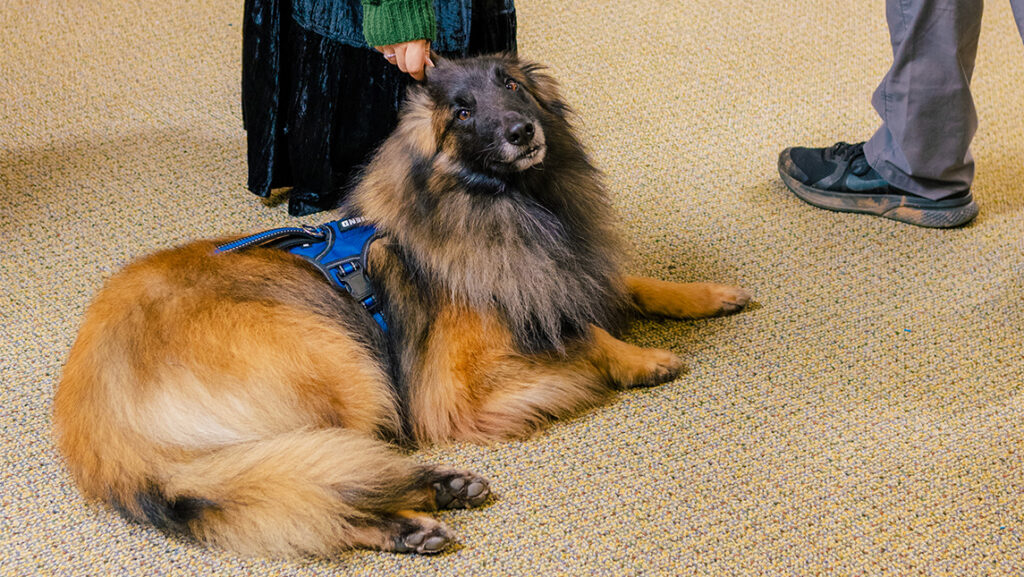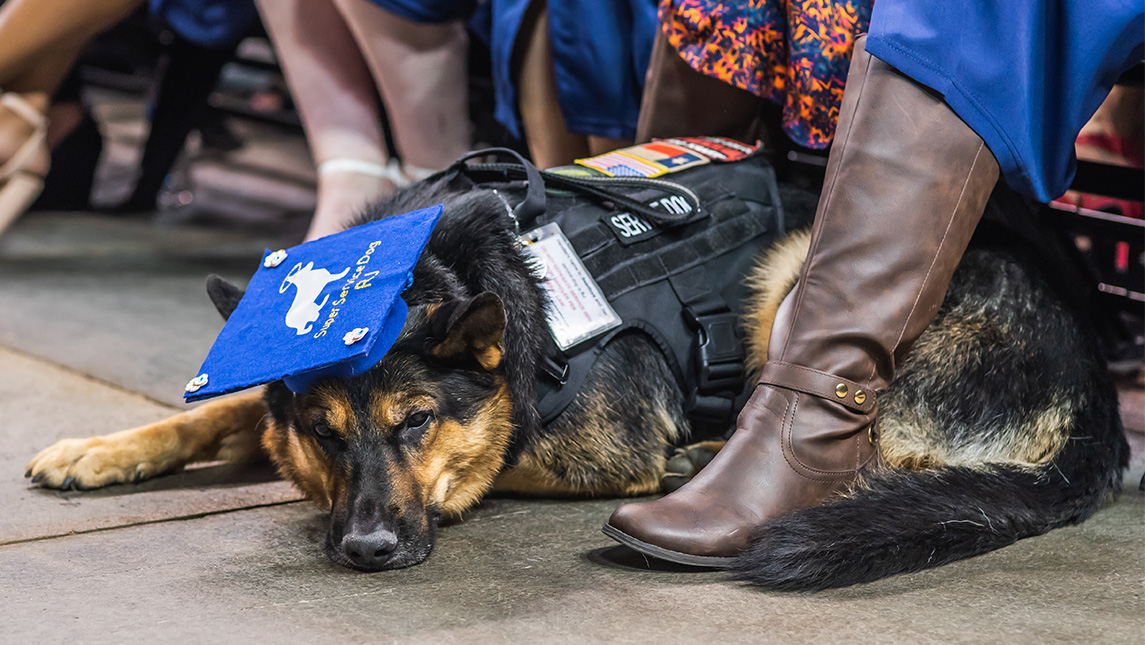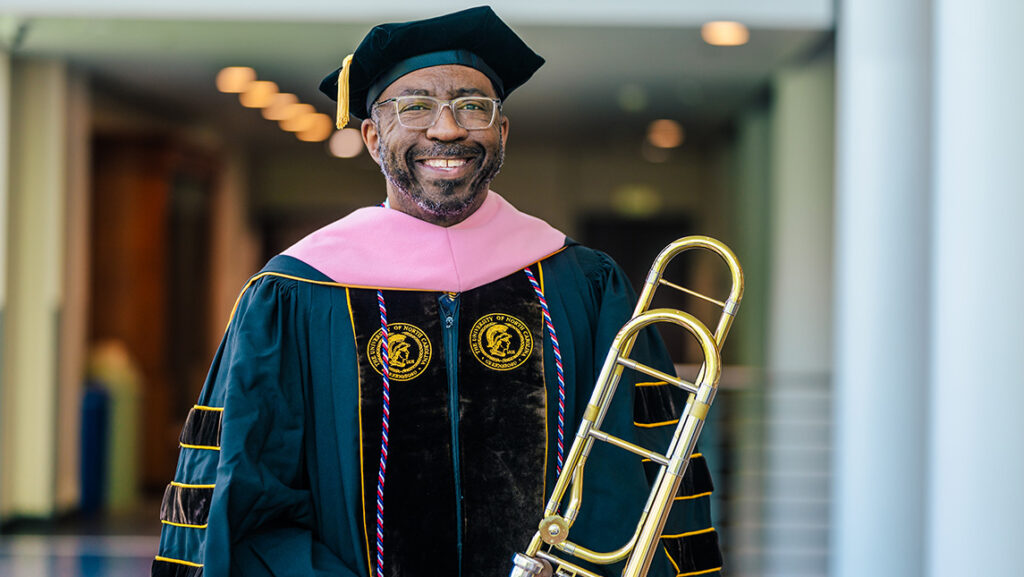In accordance with State law, service animals assisting students with disabilities are permitted in all facilities where students are allowed of the university.
A service animal is defined as an animal that is individually trained to do work or perform tasks for the benefit of a person with a disability. A disability may be physical, sensory, psychiatric, or intellectual, and may not be apparent from visual observation. The work or tasks performed by a Service Animal must be directly related to the person’s disability.
UNCG seeks to be a welcoming environment for all service animals and service animals in training, and to remain in compliance with federal law regarding service animals. The Office of Accessibility Resources & Services (OARS) provides information on what all faculty and staff may or may not do with a service animal on campus:
Service Dogs
If you see someone with a dog and want to determine if it is a service animal, at this time, there are only two questions that may be legally asked:
- Is this a service dog needed due to a disability? If “YES,” you may not ask about the disability, nor for any verification. If “NO,” you may continue with further questions; e.g., “Has this dog been approved to be in this location with you as an accommodation for a disability?” In this case, feel free to check with OARS for verification.
- If yes to #1, then: What task is it trained to perform? You may not ask for a demonstration.
If it is obvious that the dog is a service dog (e.g., Guide Dog), no questions may be asked. A service dog is not required to wear identification as a service dog. Any such verification is not proof that the dog is a service dog and is not recognized by either the Americans with Disabilities Act (ADA) or the Department of Justice (DOJ).
- A Service Dog is a working animal. The service dog and its owner are a working team. A service dog remains with its owner while the service dog is working.
- Do not pet the service dog when it is working. Petting distracts the dog from its job and the owner could get hurt. Also, don’t call the service dog by name when it is working as this, too, is distracting.
- Do not offer the service dog food or other distracting treats without the owner’s permission.
- Service dog owners want dog lovers to know it’s not all work and no play for service dogs. There are times when it is okay to pet a service dog. Typically, the dog is considered on-duty if wearing a harness (although the dog may be on-duty and not wearing a harness; it may be leash or voice-controlled). When off-duty, the service dog is playing and is just an ordinary dog. However, please ask the service dog owner if it is okay for you to join in before you start playing with the service dog.
- Service dog owners do not want people to be afraid of their service dogs. Service dogs are well trained and under their owners’ command. Sometimes a service dog will make a mistake and must be corrected to maintain its training. This correction usually involves a verbal admonishment coupled with a leash correction. Service dog owners learn the appropriate correction methods to use with their dogs.
- Service dogs go where their owners go: inside campus buildings and offices, inside the residence halls and rooms, in classrooms, in public restrooms, and in the cafeteria, for example. When the student service dog owner is seated, the service dog will stay by the student’s side. The service dog will sit at the student’s feet, next to the student’s chair, or sometimes – if the service dog can fit – underneath the student’s chair. Occasionally, a service dog is trained to provide pressure therapy to the owner. In such cases, the animal may appear to jump on the student or need to jump on adjacent furniture to perform this task. Others may be small and carried in chest packs to be able to detect changes in insulin levels, heart rate, etc.
- Service dogs will not interfere with introductions or friendships. Service dog owners learn to care for their service dogs: to feed, bathe, and clean up after them.
- Training organizations and people training a Service Animal have the same access rights as people with disabilities using a Service Animal, but must be identified as a Service Animal in Training.
Emotional Support Animals


An emotional support animal (ESA) is an animal of any species that, by its mere presence, provides comfort and/or support to an individual with a disability. An ESA is an accommodation and therefore, must be approved via OARS.
The Fair Housing Act requires that ESAs be considered a reasonable accommodation in campus housing. To be approved for an emotional support animal, students must comply with UNCG policy. If an animal is disruptive, we may ask the owner to obtain control and/or resolve the disturbance. If persistent, we may require the owner to escort the animal off campus.
NOTE: Neither service dogs nor ESAs are required to wear a vest, ID tag, or special harness.
ESAs may accompany their owners while in the owner’s housing area. ESAs are not typically allowed in other areas of campus, except on a case-by-casebasis, for which an accommodation letter would be provided.
Please contact OARS at 336.334.5440 if you have any questions or concerns about service dogs at UNCG.
The UNCG Policy contains rules and guidance for all animals on campus grounds, which can be read here. The Higher Education Mental Health Alliance provides more information related to the current issues and trends surrounding animals on campus here.
Photography by Sean Norona and Jiyoung Park, University Communications



